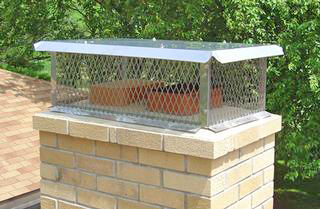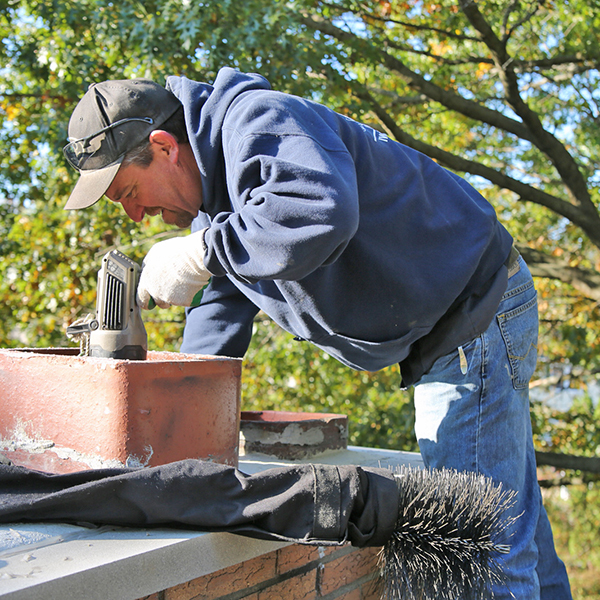9 Important Chimney Basics
Chimneys are out of sight and out of mind. The reality is that chimneys come with heightened risks when left without regular inspections or maintenance. When homeowners learn the potential dangers and expenses associated with chimneys, they know it can be far too costly and hazardous to ignore them. The following are important chimney basics that every homeowner with a chimney needs to know.
Know Your Chimney Type
There are various kinds of chimneys, and it’s important to become familiar with the type of chimney connected to your heating appliance. Masonry chimneys are considered the safest, though it’s important that they have an undamaged chimney liner. Factory-made metal chimneys are also known as pre-fabricated chimneys. Whereas, many older homes have single-walled metal chimneys, which are thin metal pipes.

Chimney Cap Installation
If you have no chimney cap, it’s best that you waste no time in having one installed. A chimney cap serves several important functions. Most importantly, it keeps water from flowing directly into your chimney system whenever it rains or snows. It can also keep animals and debris out and prevent hot embers from escaping the chimney, if you choose a cap with mesh.
Have Your Flue Checked
The flue lining inside your chimney provides the path for a draft and for toxic combustion gases to exit the home. The lining also keeps your home and its occupants safe from a dangerous fire and from toxic combustion gases.
If the liner is damaged, repair or replacement is needed before using the heating appliance again.
Check Your Bricks
The firebricks inside your hearth must be in good condition because they protect your home from intensely hot temperatures and from leaks of toxic gases. If any deterioration occurs, firebricks should be repaired before using the fireplace again. The bricks on the rooftop chimney stack are highly vulnerable to damage caused by moisture. You can save big bucks on repairs by making sure water isn’t getting inside the chimney system.
Know How to Build a Fire
A frustration homeowners often experience is difficulty getting wood fires started. Information follows to address common problems: Use only seasoned firewood, which means it has low moisture content of less than 20%. Ensure that air is getting to the fire and make sure there’s a draft in the chimney; if your home is too airtight, it can affect both of these requirements for fires. A temporary fix is to open a nearby window.
Understand the Danger of Chimney Fires
A myth about chimney fires is that they can be good for cleaning out the sooty mess inside. In reality, chimney fires are extremely dangerous. They often result in a chimney liner being destroyed, leading to an out-of-control house fire. If you think you may have a chimney fire, calmly get everyone out of the house and call 9-1-1 for the fire department.
Install Smoke Detectors and Carbon Monoxide Detectors
When you have a solid fuel heating appliance, the risk of a fire or a leak of toxic gases is heightened. It is essential to keep operational smoke detectors and carbon monoxide detectors in your home. Remember that smoke is what kills most people when fires occur. Also, carbon monoxide is odorless, tasteless, invisible, and symptomless. If there is a leak, people who are exposed rarely know in time to survive unless there is an alarm to give warning.
Schedule Annual Chimney Inspections
 chedule your chimney to be inspected by chimney sweep experts annually. This is highly recommended by all fire safety experts. It’s also the primary way to learn whether your flue needs to be repaired or replaced.
chedule your chimney to be inspected by chimney sweep experts annually. This is highly recommended by all fire safety experts. It’s also the primary way to learn whether your flue needs to be repaired or replaced.
Schedule Chimney Cleaning
When you burn a wood fire, creosote is deposited in your chimney liner. The creosote builds up, layer upon layer. If you don’t schedule routine cleaning, the creosote can create blockage that prevents combustion gases from exiting the home. Creosote is highly flammable and also increases the risk of chimney fires.
Contact the experts at Chimney Specialists Inc. for chimney inspections, chimney cleaning, chimney maintenance, masonry repairs, and all other chimney concerns. We’re also a supplier of hearth products and can help you decide when choosing a new fireplace, pellet stove, gas stove, or another modern, efficient heating appliance. Our contact information is below.
Chimney Specialists Inc.
869 Main Street, Highland, WI
Phone: (608) 929-4887 / Toll Free: (800) 395-6660
Dubuque Fireplace & Patio
925 Century Drive, Dubuque, Iowa
Phone: (563) 582-5156.







